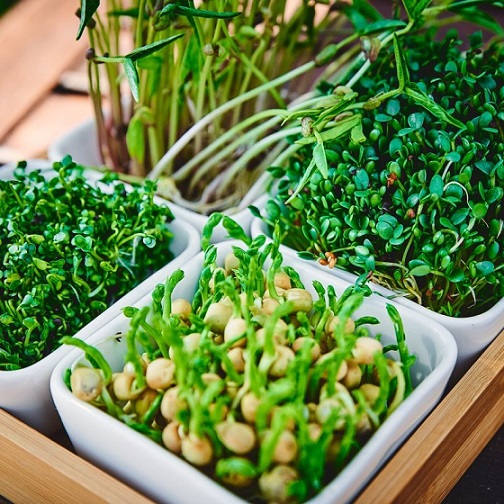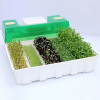Definition of an adaptogenic plant:
Thanks to their active components, adaptogenic plants help increase our adaptability and better combat various stresses (mental and/or physical) or recover from them, whatever they may be. The most well-known plants are notably Rhodiola, ashwagandha, ginseng, sea buckthorn, or eleuthero.
History of the word "adaptogen" Sure, please provide the text you would like to have translated from French to English.
It originates from a Russian toxicologist, Nicolaï Lazarev, during the Second World War, even though the properties of various adaptogenic plants have been recognized for centuries. Sure, I'd be happy to help! Could you please provide the complete text you would like translated? In the early 1960s, one of his former students, Israel Brekman, continued his work and specified the three criteria for adaptogenic plants:
- They must not be toxic.
- They help increase the body's resistance to physical, chemical, or biological aggressions without stimulating the various organs of the body.
- They have an action that normalizes, restores, and maintains balance in order to promote a better response to various stresses.
How do adaptogenic plants work ?
When faced with physical or mental stress, the human body goes through the General Adaptation Syndrome (defined by Hans Selye).
It is composed of 3 phases:
- The ALARM phase: the body is suddenly exposed to stress. The brain thus prepares its means of defense. This phase is divided into two stages (shock and counter-shock).
- The RESISTANCE, HABITUATION, or ENDURANCE phase: the body gets used to the stress.
- The EXHAUSTION phase: the body can no longer adapt to what it is undergoing.
Adaptogenic plants can help us stay longer in the resistance phase by delaying exhaustion. They also stimulate the brain to keep it awake and to have positive thoughts. At present, adaptogenic plants are widely used in herbal medicine or as dietary supplements.
Example: the blackcurrant bud It seems like your message is empty. Could you please provide the text you would like translated from French to English?
The blackcurrant bud macerate is a powerful bud in gemmotherapy and a true Swiss army knife. Indeed, it combines several benefits:
- It is cortisone-like, meaning it behaves like an anti-inflammatory by stimulating the production of cortisol by the adrenal glands.
- It intensifies the effects of other buds or plants when they are consumed at the same time.
- It is adaptogenic and encompasses all the benefits mentioned earlier.
It is therefore indicated in many disorders that we may encounter and particularly address regarding:
- The nervous system
- The renal system
- The circulatory system
- The respiratory system
- The Cut-Off Troubles
- The joints
- The side effects of chemotherapy (chemo-protective thanks to its adaptogenic effect can regulate the toxic effects)
However, certain precautions should be taken when using it: it is advised not to take it in the evening due to its stimulating effect. Hypertensive individuals should abstain, as well as children under 3 years old and pregnant women (due to the alcohol content in the macerate).
To go further: See. the book "Gemmotherapy by Philippe ANDRIANNE"
What are the benefits of sprouted seeds and young shoots ?
Germination is a process that increases the bioavailability of nutrients in seeds and legumes, thereby enhancing their nutritional quality. She improves the content of antioxidants, vitamins, and minerals, and reduces anti-nutrients that can interfere with nutrient absorption .
Their concentration in nutrients is already well known to aficionados of raw food, or to consumers who wish to address the deficiencies associated with a modern diet that is often devitalized.
Indeed, regularly consuming seeds and legumes provides essential minerals such as magnesium (592 mg per 100g of pumpkin seeds), phosphorus (200 mg per 100g of sprouted wheat seeds), potassium (322 mg per 100g of sprouted lentil seeds), calcium (1440 mg per 100g of poppy seeds), zinc (10.2 mg per 100g of sesame), and iron (33.5 mg per 100g of fenugreek). They also contain vitamins B and A (mustard seeds). A spoonful of sunflower seeds provides nearly 50% of the daily recommended intake of vitamin E (see Ciqual nutritional table - Anses). This makes them an excellent source of micronutrients, hence their designation as superfoods, to be incorporated without delay into a varied and balanced diet.
Oilseeds such as sesame seeds, pumpkin seeds, sunflower seeds, almonds, etc., can also be sprouted to eliminate phytic acid (an enzymatic inhibitor), an anti-nutrient that reduces the availability of minerals it binds to and hinders their proper absorption by the body. When rehydrated, the seeds release an enzyme called phytase, which breaks down phytic acid and increases the availability of minerals.
A diet rich in antioxidants, vitamins, minerals, and other nutrients is generally beneficial for brain health and could help reduce the risk of neurodegenerative diseases. Now he There are seeds that, once germinated, contain nutrients that can support cognitive health. Here are a few examples:
- The broccoli seeds sprouted: they contain glucosinolates, which may have anti-inflammatory and antioxidant properties.
- The sunflower seeds sprouted: they are a good source of vitamin E, an antioxidant that can help protect nerve cells.
- Sprouted alfalfa seeds: they contain a variety of vitamins and minerals that can support overall health.
- Sprouted flax seeds: they are rich in omega-3, a type of essential fatty acid that is important for brain health.
- Sprouted lentils: they contain amino acids and are a good source of fiber, which can support overall health.
- The chia seeds Sprouted: like flax seeds, chia seeds are also a good source of essential omega-3 fatty acids.
Each seed would deserve a case-by-case study; however, the few examples mentioned show that sprouted seeds embody the essential characteristics of adaptogenic plants:
- Increase in Stress Resilience Just like adaptogenic plants, sprouted seeds help the body manage stress. By sprouting, they release bioactive compounds that enhance the body's resistance to external aggressions.
- Homeostatic Balance Sprouted seeds contribute to the body's homeostatic balance, a key characteristic of adaptogens. They provide a wealth of essential nutrients that promote the balance and proper functioning of bodily systems, including the immune and endocrine systems.
- Non-Specific Effects : Similar to adaptogenic plants, the action of sprouted seeds is not limited to a single organ or system. Their impact is global, supporting various bodily functions, from digestion to enhancing energy and concentration.
- Absence of Harmfulness : Organic sprouted seeds, tested for their germination capabilities, are safe and non-toxic, even when consumed regularly and over long periods, which is a fundamental characteristic of adaptogens. In fact, they are the only foods that all profiles in naturopathy agree on.
- Normalization of Bodily Functions Finally, sprouted seeds help to normalize bodily functions. Whether by stimulating a weakened immune system or calming an overstimulated nervous system, they work to restore the body's natural balance, bringing the pendulum back to the center.
In conclusion, the nutritional richness provided by adding sprouted seeds to a daily diet is increasingly recognized. Their particular benefits as sprouted seeds, considered mini adaptogenic plants, provide additional motivation to encourage regular consumption.
To your sprouters !
Séverine Parez














